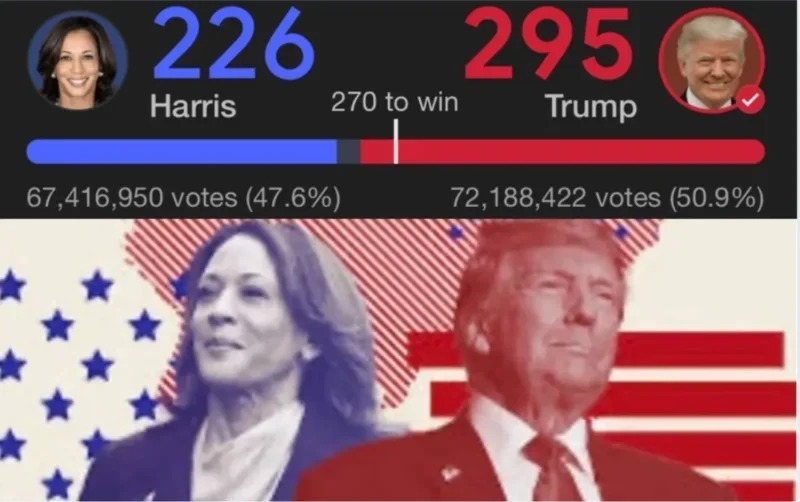Introduction: A Historic Moment
The 2024 US election marked a significant turning point in the nation’s political landscape, showcasing a divided electorate and heightened tensions that characterized the preceding campaign. Donald Trump‘s proclamation of victory initiated a moment steeped in controversy and fervent emotion, reverberating through the fabric of American society. As the nation prepared for the election, various dynamics unfolded that shaped both voter sentiment and campaign strategies.
Throughout the election cycle, Trump leveraged his established platform, focusing on themes that resonated with his base, including economic recovery, immigration reform, and criticisms of established political norms. His ability to rally supporters, combined with his provocative rhetoric, created a charged atmosphere that markedly distinguished this election from its predecessors. In contrast, opposition candidates attempted to position themselves as pragmatic alternatives, emphasizing unity and a return to bipartisan governance. However, the hues of polarization continued to dominate the discourse as both sides mobilized their constituencies for battle.
Key events prior to the election—including debates that spotlighted the candidates’ policies, controversies surrounding misinformation, and a resurgence of grassroots activism—played critical roles in shaping voter perspectives. The pervasive atmosphere of division galvanized Trump’s supporters, who viewed the election as a crucial stand against what they perceived to be an erosion of American values. Conversely, opponents expressed their apprehensions about the future of democracy and governance under a second Trump term.
This charged environment culminated in Trump’s declaration of victory, which was met with a spectrum of emotions, from elation to disbelief. The contrasting reactions among various demographic groups underscored the fragmentation of American society. The proclamation not only served as a personal triumph for Trump but also reflected the broader implications for the political landscape and democratic principles in the United States.
Key Themes from Trump’s Victory Speech
In President Trump’s victory speech, several key themes emerged that reflect his political priorities and the sentiments of his supporter base. Prominent among these themes is immigration, which has long been a cornerstone of Trump’s political platform. He reiterated his commitment to securing the nation’s borders, emphasizing the need for stringent immigration policies as a means to ensure national security and economic stability. By invoking familiar rhetoric about the dangers of unchecked immigration, Trump seeks to rally his base around a promise to restore law and order to the immigration system, a significant issue that resonates strongly within his constituency.
Another notable theme in Trump’s speech was economic policies. The president emphasized his administration’s achievements in job creation and economic growth prior to the pandemic, promising to rejuvenate the economy further. He highlighted plans to cut taxes, reduce regulation, and promote domestic manufacturing, tapping into the concerns of working-class voters who feel left behind by globalization. Trump’s message seems aimed at reinforcing his image as a populist champion, dedicated to fighting for the everyday American worker, thereby continuing to build a narrative that connects him to the common populace.
National security also featured prominently in the address, with Trump promising to strengthen the military and confront both foreign and domestic threats. His rhetoric here plays to a longstanding Republican narrative of projecting strength, which appeals to nationalistic sentiments. Furthermore, the theme of party unity was underscored as Trump called for Republicans to come together following a divisive campaign season. This emphasis on unity may indicate a strategic move to consolidate power within the party as he embarks on his next term in office. Overall, these themes are not only a reflection of Trump’s long-standing campaign messages but also present an opportunity for him to redefine his administration’s agenda in response to current issues facing the nation.
Public Reaction and Media Coverage
Following Donald Trump’s proclamation of victory in the 2024 US Election, public reactions were varied and multifaceted, illustrating the deep political divide characteristic of contemporary American society. Notable political figures across the spectrum immediately took to their platforms to share their responses. Republican allies largely expressed unwavering support, celebrating the announcement as a significant win that affirmed their collective strategy and vision. In contrast, many Democratic leaders and progressive figures responded with skepticism, voicing concerns about the implications of Trump’s claims on the democratic process and electoral integrity.
Media coverage of Trump’s victory announcement revealed contrasting narratives. On one hand, conservative media outlets lauded his speech, framing it as a reaffirmation of the people’s choice and the culmination of their collective actions over the past years. In contrast, mainstream media networks emphasized the contentious nature of the announcement, citing the lack of credible evidence to substantiate Trump’s claims while underscoring potential threats to democratic norms. This differing media representation contributed to the ongoing polarization in public opinion surrounding Trump’s presidency.
Social media platforms served as battlegrounds for public discourse, where reactions from grassroots supporters flooded platforms with positive affirmations of Trump’s leadership. Hashtags reflecting support proliferated, further solidifying his base’s enthusiasm. However, dissenting voices dominated conversations on alternative platforms, where critics expressed alarm over what they perceived as a dangerous precedent for misinformation and election integrity. Furthermore, the demographic divide was quite pronounced, with younger voters and urban populations exhibiting greater skepticism toward Trump’s narrative, while older, rural voters tended to rally in fervent support.
This multifaceted public reaction and media coverage reveal the complexities of American political engagement, reflecting not only the divided sentiments around Trump’s presidency but also the broader implications for future electoral dynamics.
Looking Ahead: Implications for the Future
Donald Trump’s proclamation of victory in the 2024 presidential election has significant implications for the Republican Party, the Biden administration, and the broader landscape of U.S. politics. As Trump resumes a prominent position within the political sphere, the Republican Party faces critical decisions about its future direction. Trump’s leadership could crystallize a return to populism, potentially reshaping the party’s platform to align more closely with his vision. This could either alienate moderate Republicans or galvanize a dedicated base, leading to an internal struggle for the party’s predominant ideology.
The implications extend to the Biden administration, which will need to navigate an increasingly polarized political environment. If Trump follows through with advocating for legislative changes rooted in his previous administration’s policies, such as immigration reform or tax cuts, it will challenge the Biden administration to respond effectively. The ability of congressional Democrats to unite against a potentially reinvigorated Trump agenda will be critical, particularly in the context of upcoming midterm elections.
Additionally, Trump’s victory may signal a shift in international relations, as his foreign policy principles could pivot away from multilateralism towards a more nationalistic approach. This could alter existing trade agreements and international alliances, requiring both allies and adversaries to reassess their strategies in dealing with the United States. The Democratic Party will likely strategize its counter-responses, intensifying efforts to reevaluate its messaging and policy stances in light of a renewed Trump leadership.
As the political landscape evolves, Trump’s return could influence both the immediate election cycle and the longer-term trajectory of U.S. politics. The challenges ahead will define governance priorities, while the opportunities arising from his leadership may awaken a competitive spirit among Democrats and Republicans alike, setting the stage for a dynamic political future.




